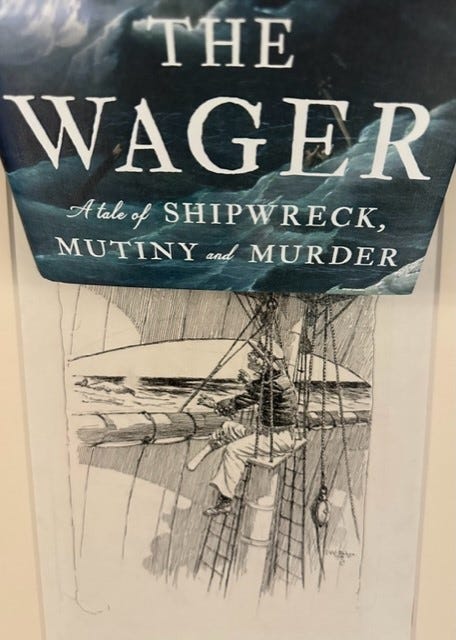Labor Day Reading
It is a warm, muggy, wonderfully empty Labor Day weekend in New York. Typical US Open tennis weather but an atypical tournament. It seems that the Americans have finally returned to the higher echelons of men’s professional tennis if the the current state of the Open is a good indicator. The pros might play tennis but for us mere mortals, a hot weekend in the city begs for a movie; however, with Barbie and Oppenheimer behind me, I am left with the seasonal September film “famine” (read Anthony Lane’s hysterical review in the most recent “The New Yorker”). We saw a decent musical (“Some Like It Hot”) yesterday but as confirmed by noted theater critic, Jackson McHenry, at lunch today, Broadway wilts in the heat awaiting the more creative, cooler months of the year. Since the dog we are sitting is not going anywhere soon, it all adds up to a great weekend to tackle that summer reading list.
Wrapped in its refreshingly compact 256 pages, The Wager by David Grann was every bit as good a read as his extraordinary Killers of the Flower Moon. Though he provides a persuasive and credible historical context at the end of the seafaring tale, Grann’s The Wager is not the profoundly disturbing tale told in his Osage County narrative. It is a very compelling, indeed gripping, mix of “Master & Commander”, “Mutiny on the Bounty” and Lord of the Flies. This is a once famous “true” story that, after exhaustive research, Grann reveals as a tale that was never told truthfully. The mythic manipulation of history seems to be Grann’s bette noir and I hope he continues mining this rich historical vein. At the end of the book, Grann convincingly argues that the truth embedded deep within the Wager’s astonishing story (or stories) was manipulated and sanitized for the sake of empire. It feels familiar and will leave you thinking about Vietnam, Iraq and all the “imperial” adventures in our lifetime. But also, at its literary heart, it is a classic twin bill: man versus nature followed by man in a state of nature. Mutinies usually involve some mix of all three of these themes. Militaries go to great and violent extents to suppress, punish and erase these internal rebellions for profoundly important reasons. There is no British Empire with a mutinous Royal Navy. Mutineers, meanwhile, go to extremes to survive and justify their suicidal actions. All of this high stakes stuff so often happens in the most extreme circumstances ranging from the perils of sailing around the howling Cape Horn with scurvy killing every other man or in the trenches of Verdun after a half million of your fellow Frenchman have been eviscerated in an area the size of a small county in Texas. All these historical motifs are captured in this terrific book. So is the spectacle of building, maintaining, staffing and sailing a man-of-war squadron … the 18th century equivalent of an American nuclear carrier group today. All of this literary and historical wizardry is, to bring things full circle, accomplished in a clean as a whistle 256 pages - a true testament to Grann, the writer.
I have not finished either of the following two books but am gripped by each. I will wait until I finish both to write any kind of review. All I can say in the meantime is that Small Mercies by Dennis Lehane (in print) and Crooked Manifesto by Colson Whitehead (Audible) are worth a stop. The former is short by this veteran’s standards but I suspect is the best writing he has done yet. The author of Mystic River, despite his apparent
retreat to California, certainly knows his Boston, its Southie and all its hatreds and color. Framed by the busing trauma of the Seventies, the book pops. The latter, Crooked Manifesto, is read by Dion Chapman and, as I wrote earlier, the book, like its prequel Harlem Shuffle, is best heard in the voice of Chapman. Both of Whitehead’s books are carefully wrought efforts to reconstruct a bygone Harlem. The writing is good … really good. The spoken word, however, brings it home.
Thank you for reading …


